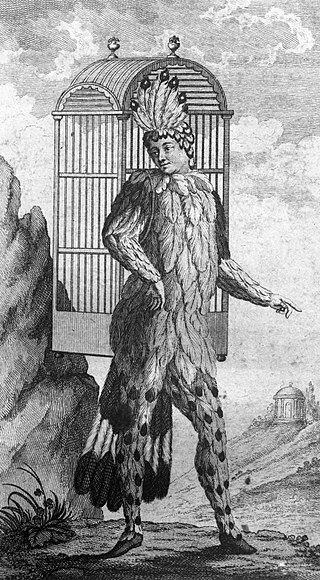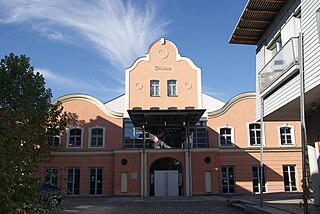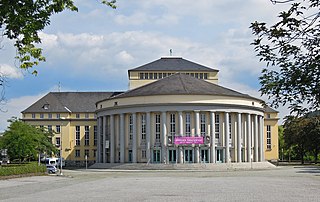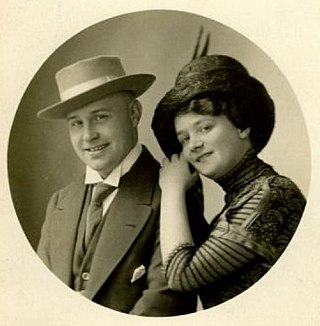
Emanuel Schikaneder was a German impresario, dramatist, actor, singer, and composer. He wrote the libretto of Wolfgang Amadeus Mozart's opera The Magic Flute and was the builder of the Theater an der Wien. Peter Branscombe called him "one of the most talented theatre men of his era". Aside from Mozart, he worked with Salieri, Haydn and Beethoven.

Werner Egk, born Werner Joseph Mayer, was a German composer.

Fierrabras, D 796, is a three-act German opera with spoken dialogue written by the composer Franz Schubert in 1823, to a libretto by Joseph Kupelwieser, the general manager of the Theater am Kärntnertor. Along with the earlier Alfonso und Estrella, composed in 1822, it marks Schubert's attempt to compose grand Romantic opera in German, departing from the Singspiel tradition. It had to wait until 1897 for a (relatively) complete performance.

Die Schweizer Familie is an opera by the Austrian composer Joseph Weigl. It takes the form of a Singspiel in three acts. The libretto, by Ignaz Franz Castelli, is based on the vaudeville Pauvre Jacques (1807) by Charles-Augustin de Basson-Pierre, known as Sewrin, and René de Chazet. The opera was first performed at the Theater am Kärntnertor, conducted by the composer, in Vienna on 14 March 1809 and was a great success in German-speaking countries in the early 19th century.

The Aalto Theatre (Aalto-Theater) is a performing arts venue in Essen, Germany, and is home to the city's opera company Aalto-Musiktheater and the ballet company Aalto Ballett. The Essener Philharmoniker serve as the venue's orchestra. The theatre opened on 25 September 1988 with Richard Wagner's opera Die Meistersinger von Nürnberg and is mainly used for opera and ballet, but also for concerts and galas.
Theater Dortmund is a theatrical organization that produces operas, musicals, ballets, plays, and concerts in Dortmund, Germany. It was founded as the Stadttheater Dortmund in 1904. Supported by the German Government, the organization owns and operates several performance spaces.

Theater Bonn is the municipal theatre company of Bonn, North Rhine-Westphalia, Germany. It is an organization that produces operas, musicals, ballets, plays, and concerts. It operates several performance venues throughout the town: Oper Bonn for music theatre, the Kammerspiele Bad Godesberg and Halle Beuel for plays, and the Choreographisches Theater for ballet and dance.

Musiktheater im Revier (MiR) is the venue for performing opera, operetta, musical theatre and ballet in Gelsenkirchen, Germany. It opened on 15 December 1959; it is listed since 1997 as a protected cultural monument.

Theater Münster is a municipal theatre in Münster, North Rhine-Westphalia, Germany, for plays and music theatre. When it opened in 1956 it was regarded as the first new theatre building in Germany after World War II. It integrates some ruins of the former theatre and musical school destroyed in the war.

Schlosstheater Schwetzingen is a court theater in Schwetzingen, Baden-Württemberg, Germany. The historic building, opened in 1753, is part of Schloss Schwetzingen and since 1952 the principal venue of the Schwetzingen Festival. It is also called Hoftheater, Hofoper, and Comoedienhaus. The frequently applied name Rokokotheater is misleading, because it shows also neoclassical elements, added in 1762.

The Volkstheater Rostock is the municipal theatre of the Hanseatic city of Rostock. It has three venues: the Großes Haus, the Theater im Stadthafen and the Kleine Komödie and puts on plays, musical theatre/opera, ballet and orchestral concerts. Norddeutsche Philharmonie Rostock is the orchestra for musical theatre and concerts. There is a children's theatre and a theatre youth club.

The Stadttheater Bremerhaven is a theatre in Bremerhaven, Germany. Founded in 1867, it serves three genres: opera and other musical theatre, spoken plays, and dance. A theatre built on the present site in 1911 was largely destroyed in World War II; a new house was built in 1952 which incorporated the surviving Jugendstil facade. The smaller Bürgerhaus Lehe, which served as a home before the rebuilding, is currently used as a venue for chamber pieces.
Richard Mohaupt was a German composer and Kapellmeister.
Tobias Kratzer is a German stage director, especially of opera, who has worked internationally after winning a competition in Graz with two entries in 2008. He has staged works by Verdi and Wagner, but also contemporary music. He directed Wagner's Tannhäuser for the 2019 Bayreuth Festival.

The Velodrom is a venue of the Theater Regensburg and is located on Simon-Oberndorfer-Platz at the beginning of the Westnerwacht in Regensburg. The word Velodrom comes from Velodrome, the French word for cycle racing track.

Theater Saarbrücken, officially Saarländisches Staatstheater since 1971, is the state theatre of Saarland in its capital Saarbrücken, Germany. It has several divisions and offers annually around 30 new productions in around 700 events for more than 200,000 people. Its venues are Großes Haus, Alte Feuerwache, Congresshalle and sparte4. While theatre in Saarbrücken has a long history, the present main venue was completed in 1938, with plans commissioned by the Nazi regime.

Rudi Gfaller was an Austrian operetta composer and singer. Born in Vienna, he began his career as an actor and singer and appeared in various provincial theatres in Germany. In 1906, he composed the first of his twelve operettas. Gfaller was married to the operetta singer Therese Wiet and often appeared with her in Leipzig where the couple were based for most of their careers. In 1943 he retired to their house in Bad Ischl where he died at the age of 89.
Ingomar Grünauer is a contemporary Austrian composer. The focus of his work is on pieces in smaller forms for music theatre. His opera Cantor - Die Vermessung des Unendlichen, which deals with the existential conflicts in the life of the revolutionary mathematician Georg Cantor (1845-1918), was premiered on 10 November 2006 at the Halle Opera House under the direction of Roger Epple.
Wilfried Hiller is a German composer. He became known above all for his stage works for families, children and young people.
















